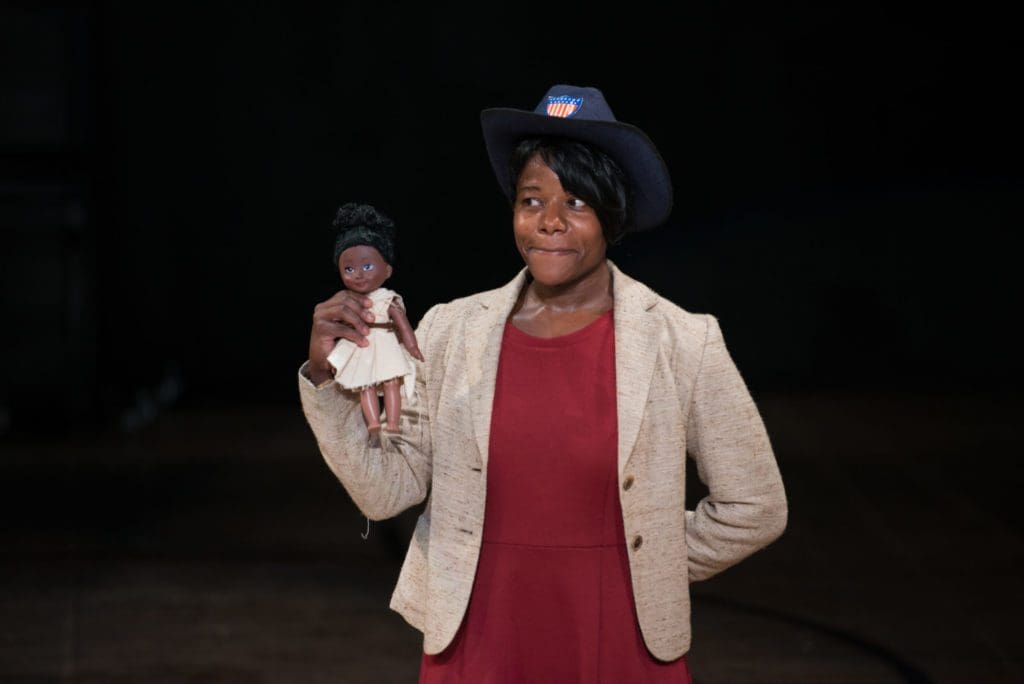We Don’t Study History, We Just Keep Reenacting It: A Conversation with Jenn Kidwell
It’s not easy to get a hold of Jenn Kidwell. The wildly accomplished performing artist, co-founder of JACK in Brooklyn, and co-founder/co-artistic director of Lightning Rod Special keeps a busy schedule these days. Prepping her and co-creator Scott Sheppard’s show Underground Railroad Game (tickets/info) for a remount here at FringeArts is just one thing crowding her plate, but with tech week fast approaching Kidwell still managed to find time to generously chat with me one rainy afternoon about her process, the show’s evolution, and the aspects of our country’s troubling relationship with its past, which the show seeks to interrogate. “Making everyone participate in the same way when what we’re participating in does not treat people the same way is problematic,” Kidwell said, adding, “There’s no way for us to actually learn and change what we’re doing, it just reifies systems of the past.”
“We don’t study history, we just keep reenacting it.”
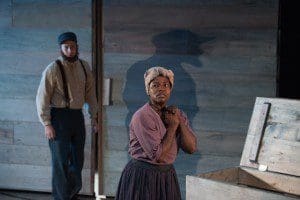
Photo by Johanna Austin
It’s that culture of reenactment that frames Underground Railroad Game, and Kidwell and Sheppard take it to task as questions of race, sexuality, dominance, privilege, and pedagogy all become inextricably tangled in their characters’ misguided attempts to educate. Based on experiences from Sheppard’s schooling, the show follows two teachers—a black woman and a white man—as they lead their middle school class (i.e. the audience) through an immersive, interactive unit on the Civil War by day and engage in a taboo-defying, sex-forward relationship by night. The 2015 Fringe Festival breakout hit—which critic Howard Shapiro called, “Hands-down the best piece I’ve seen in the Fringe Festival this year and in many years”—returns this week after months of tireless re-tuning.
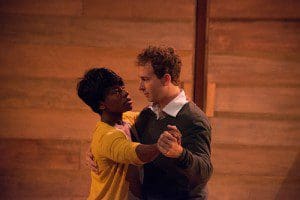
Photo by Johanna Austin
When I asked Kidwell if anything had surprised her throughout the show’s development she chuckled and claimed the fact that she and Sheppard have been able to make it together at all has been one of the biggest surprises. She attributed this to their very different processes and viewpoints, but as she further explained their working dynamic it seemed as though this creative friction was crucial in developing the show and tackling such contentious subject matter. “There’s a way you can shut off your listening if you’re dealing with somebody who you know thinks the same way you do, but that’s not in this room,” she explained. “Here, it’s this constant state of being open in order to try and understand what the other person is saying or where they’re coming from.”
This openness, as well as a willingness to play together and play things out onstage, is essential to crafting works of devised theater and if Underground Railroad Game is any indication Kidwell has a remarkable talent for it. “I really feed off of working with other people,” she told me, readily admitting she’s not the type of artist who does her best work sitting at home, quietly typing away at her computer. “I have an interest in asking questions, cracking things open, and playing with images,” she explained. “I think I tend to start with an image that I’m interested in seeing and ask how can it fit within the framework of the piece or what’s a performative dare I can give myself.”
Putting it another way that exemplifies her fearless approach to art-making, she added, “What’s the thing we’re not supposed to do that might actually help us say something new about this circumstance?”
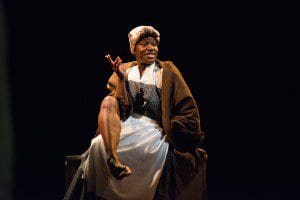
Photo by Johanna Austin
One such image that found its way into Underground Railroad Game was that of the “Magical Negro.” Originally coined by filmmaker Spike Lee, the term points to a troubling trope in American cultural production that imbues black characters with mystical, all-knowing qualities and who exist only to aid white protagonists, in turn allowing us to distance ourselves from their personhood. Think Michael Clarke Duncan in The Green Mile, Laurence Fishburne in The Matrix, or Will Smith in The Legend of Bagger Vance. Taking cues from these and similar well-known examples and finding inspiration in the silhouette work of visual artist Kara Walker, Kidwell wanted to play with the trope but had to figure out where it fit within the show’s pedagogical context. After experimenting with it in rehearsal for some time, Kidwell realized that the Magical Negro should be a special guest at a school assembly, an “actual slave” the teachers had invited to speak in one of many horrendously ill-judged attempts to engage their students. It’s a remarkably discomforting, surreal, disturbing, yet absurdly funny scene and it continues to evolve as Kidwell and Sheppard strive to unapologetically deepen aspects and ideas of the show that may have been previously obscured by metaphor.
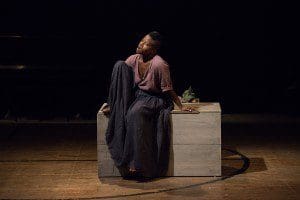
Photo by Johanna Austin
Though Underground Railroad Game’s titular plotline was pulled from Sheppard’s middle school experience, I was curious to know if any aspect of Kidwell’s Civil War education had influenced the show. She in turn regaled me with a particular tale from her time as a middle schooler in Baltimore. Her faculty advisor, the school’s art teacher and wife of a Civil War buff, concocted a sepia print photo shoot that asked students to dress up in era appropriate garb. What in conception may have felt like an innocuous activity to her advisor stood out to young Kidwell at a small school with a predominantly white student body in a class where she estimated a sixth of the students were black: “I remember being kind of excited because I was so into history and all these crazy clothes, but also saying to myself, ‘Now, what the fuck are we going to wear?’”
“It points to a lack of awareness that we’re not all having the same experience,” Kidwell told me, adding, “In not acknowledging that fact we’re cutting off our ability to craft new experiences.”
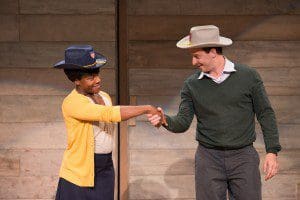
Photo by Johanna Austin
Indeed, when a cursory Google search of “underground railroad game” yields results of board games and even a 3D choose your own adventure game from one of the world’s largest non-profit educational institutions that puts players in the role of a runaway slave, it begs us to ask why we continue to trivialize one of the most horrific chapters in our shared history and question what effect it is having on our still troubled society (Ed.‘s note: I haven’t played any of the aforementioned games and thus can’t make an entirely informed judgement, but…). Thankfully, we have thoughtful and boundary-pushing artists like Kidwell, Sheppard, and their entire production team to help illuminate and interrogate these harsh realities that continue weigh on us all.
—Hugh Wilikofsky
Underground Railroad Game premieres the Wednesday, May 12 and runs until May 21! Click here for more info and to grab tickets.

